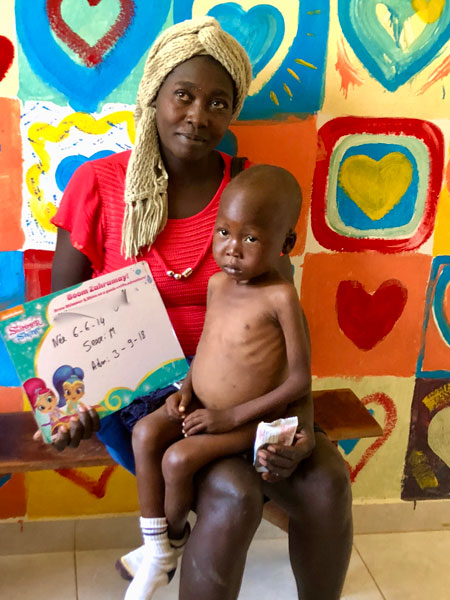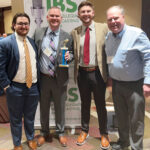By Anne Marie Amacher and Barb Arland-Fye
The Catholic Messenger
Service trips to Haiti by groups in the Diocese of Davenport have been suspended since 2019 due to political unrest and COVID-19. Gang violence continues and with the assassination of the country’s president on July 7, unrest ravages the country.

A mother and her son participate in the Medika Mamba program at the ServeHAITI clinic in Grand-Bois, Haiti. The program fights malnutrition, a pressing challenge in Haiti.
The Haiti committee of St. John Vianney Parish in Bettendorf has not been to Jean Denis, Haiti, since its mission trip in 2018, said committee member Mark Blaser. The parish made an initial visit to Jean Denis in September 2010, eight months after a catastrophic earthquake that crippled the country.
Volunteers with ServeHAITI, which has forged a relationship with the people of Grand-Bois, have not traveled to Haiti since September 2019, said Liz McDermott of Our Lady of the River Parish in LeClaire. Since the early 2000s, she and members of her parish and other parishes in the Diocese of Davenport have been engaged in work to address issues of health, water and education in Grand-Bois.
The crisis in Haiti “affects all organizations working down there,” McDermott said. She and her sister, Cindy Broders, both of whom are nurses and have tended to patients in Grand-Bois many times, spoke with each other about their concerns for the Haitians. “How will this affect the health of the people?” McDermott asked. She is particularly concerned about nutritional needs and malnutrition.
One of her brothers called her after the assassination of Haiti’s President Jovenel Moïse to ask if she had heard the startling news. “You feel so helpless. It’s one thing to have political turmoil, but this was like the perfect storm of difficult things,” McDermott said.
The staff members at the ServeHAITI clinic “are keeping the clinic open 24-7. They are doing the best they can with what they have.” ServeHAITI employs 50 people in Grand-Bois at the clinic or as community health care workers.
Blaser said a medical team from the St. John Vianney Haiti committee had traveled annually from 2011-2018 with only one cancellation in 2017 due to unrest in Haiti. “We have not been able to return because of safety and/or COVID concerns,” he said.
The St. John Vianney team maintains contact with Father Jean Solomon, the pastor of Our Lady of the Rosary Parish in Haiti. “He has guided us since our involvement,” Blaser said. “He is extremely effective and has managed to keep the new school, dedicated in 2018, operational, despite local violence and COVID-19 concerns. It does not seem that COVID-19 has been a prominent problem in Jean Denis, but gang violence, even in this rural area, has.”
School attendance is down, but students remain in class and teachers are paid regularly through support of St. John Vianney and the Florida non-profit Hands Together for Haitians, Blaser said. “They were instrumental in our work there from the very beginning and our relationship is synergistic.”
Blaser said the prevalence of COVID-19 has been difficult to gauge “because their health care system is so weak. Virtually no one in Haiti has been vaccinated.
Virtually no one in Haiti has been vaccinated. The reasons are likely multifactorial, but I believe they are the only country in the Western Hemisphere to be completely unvaccinated.”
The St. John Vianney team typically brings medical and other supplies with them on a mission trip but has not been able to send supplies independently because of the inability to “overcome customs and supply security problems that shipping supplies entail.”
The same holds true for ServeHAITI, which means the Haitians must purchase medicines and other supplies in Haiti where supplies are scarce and expensive. Donors continue to provide financial support to ServeHAITI. “I don’t know what we would do if we weren’t still getting donations,” McDermott said.
Medical care in Jean Denis “is nearly non-existent with the exception of a nearby sparsely supplied maternity unit staffed by nurse midwives,” Blaser said. The parish school operates a simple clinic for the students, largely staffed by a nurse’s aides, but offer simple medications, wound care and intestinal parasite prophylaxis.
The mission team’s current effort focuses on local economic development through funding an organization called Unlocking Communities that uses trained entrepreneurs selling simple water purification systems and small efficient stoves, Blaser said. “Proceeds will then be re-entered into the business with hopes it becomes sustainable. If other markets are identified, the business methods can be extrapolated to more entrepreneurs and expand local business opportunities relevant in the community.” Father Salomon supports this venture, Blaser noted.
“We are also exploring a more complex project led by Hands Together that will hopefully foster improved rice production regionally.” He said the mission team does not anticipate resuming its medical missions until January 2023 “as we pray for a less chaotic state of affairs there.”
“Pray for Haiti,” McDermott said. “When things like this happen the people who suffer the most are the people who have the least.”











